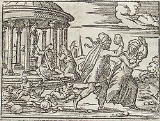
Deucalion
Overview
In Greek mythology
Deucalion was a son of Prometheus
and Pronoia. The anger of Zeus
was ignited by the hubris of the Pelasgians
, and he decided to put an end to the Bronze Age
. Lycaon
, the king of Arcadia
, had sacrificed a boy to Zeus, who was appalled by this savage offering. Zeus loosed a deluge, so that the rivers ran in torrents and the sea flooded the coastal plain, engulfed the foothills with spray, and washed everything clean. Deucalion, with the aid of his father Prometheus, was saved from this deluge by building a chest.
Greek mythology
Greek mythology is the body of myths and legends belonging to the ancient Greeks, concerning their gods and heroes, the nature of the world, and the origins and significance of their own cult and ritual practices. They were a part of religion in ancient Greece...
Deucalion was a son of Prometheus
Prometheus
In Greek mythology, Prometheus is a Titan, the son of Iapetus and Themis, and brother to Atlas, Epimetheus and Menoetius. He was a champion of mankind, known for his wily intelligence, who stole fire from Zeus and gave it to mortals...
and Pronoia. The anger of Zeus
Zeus
In the ancient Greek religion, Zeus was the "Father of Gods and men" who ruled the Olympians of Mount Olympus as a father ruled the family. He was the god of sky and thunder in Greek mythology. His Roman counterpart is Jupiter and his Etruscan counterpart is Tinia.Zeus was the child of Cronus...
was ignited by the hubris of the Pelasgians
Pelasgians
The name Pelasgians was used by some ancient Greek writers to refer to populations that were either the ancestors of the Greeks or who preceded the Greeks in Greece, "a hold-all term for any ancient, primitive and presumably indigenous people in the Greek world." In general, "Pelasgian" has come...
, and he decided to put an end to the Bronze Age
Ages of Man
The Ages of Man are the stages of human existence on the Earth according to Greek mythology. Two classical authors in particular offer accounts of the successive ages of mankind, which tend to progress from an original, long-gone age in which humans enjoyed a nearly divine existence to the current...
. Lycaon
Lycaon (mythology)
For the Trojan Lycaon, see Lycaon .Lycaon was a king of Arcadia, son of Pelasgus and Meliboea, who in the most popular version of the myth tested Zeus and as a punishment was transformed into the form of a wolf.-Versions of the myth:...
, the king of Arcadia
Arcadia
Arcadia is one of the regional units of Greece. It is part of the administrative region of Peloponnese. It is situated in the central and eastern part of the Peloponnese peninsula. It takes its name from the mythological character Arcas. In Greek mythology, it was the home of the god Pan...
, had sacrificed a boy to Zeus, who was appalled by this savage offering. Zeus loosed a deluge, so that the rivers ran in torrents and the sea flooded the coastal plain, engulfed the foothills with spray, and washed everything clean. Deucalion, with the aid of his father Prometheus, was saved from this deluge by building a chest.

